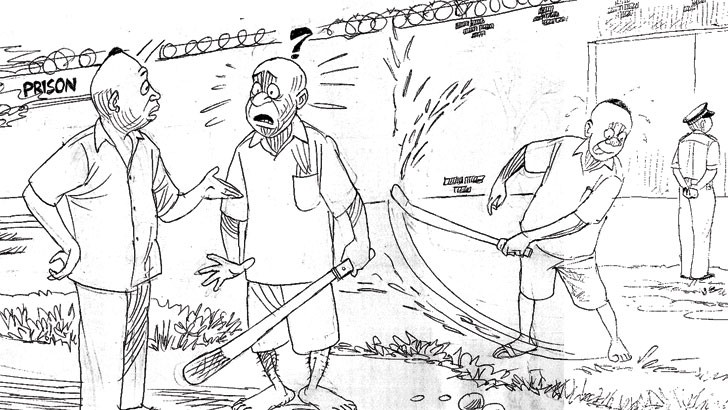The glue of greed
One season, kalulu, world champion of greed and trickery, did not plant any crop.
So it thought out a plan.
Night after night, when everyone else had gone to sleep, kalulu scampered to the fields and pulled out some cassava, cooked and ate them.
Villagers noticed that their cassava was mysteriously disappearing.
A meeting was summoned to plan on how to catch this cassava-stealer with a trick even the trickiest trickster would not be able to wriggle free from.
There in the moonlight, kalulu saw a skinny, scruffy-looking figure stretching out its arms.
“Hey, you! So you don’t know who owns this farm? Go away, you rogue, you hear!” shouted kalulu as bravely as he could.
But the figure did nothing.
kalulu gave the figure a mighty slap.
But kalulu’s arm got stuck. His next arm and his legs stuck also.
He wriggled. He squiggled. He jiggled.
Kalulu’s pride and anger now turned to beggarly fear.
“I am sorry for what I said. I didn’t mean it … Only put me down. I am aching. Oh, mister man, please, please!”
Little did kalulu know that he was not speaking to a human being at all – it was a scarecrow covered with the stickiest, gummiest gum from the stickiest, gummiest gum-tree the forest could provide.
Despite its considerable resource endowment, Malawi continues to barely subsist at the periphery of the global economy and cling to the margins of general world affairs.
Mere survival has become a daily struggle for the majority of Malawians afflicted by poverty and hunger, succumbing to preventable diseases and vulnerable to premature death and insecurity.
To be brief, much of Malawi today is so plagued by misery that it is clear the country is trading on a deep undercurrent of popular discontent and latent political instability lurking beneath a façade of fear-induced calm.
But bottomless corruption as recently reported by Malawi News whereby a journalist managed to fraudulently obtain critical documents from some dysfunctional institutions is one of the reasons driving the majority of Malawians into the quagmire of widespread misery, worsening deprivation and deepening despair.
Minister of Transport and Public Works Francis Kasaila might have his obviously infantile response to the report.
Nethertheless, it would seem necessary that the country seeks to find out what gives birth to corrupt practice; what are the social circumstances that have enabled corrupt practice to become a pervasive and entrenched social phenomenon in Malawi.
This is vitally important as it would give government greater possibilities to prevent corruption so that the country is not confined merely to the task of ‘punishing’ corrupt actions when they ‘occur’ and are ‘discovered’.
If one could hazard a guess, the existence of a political and social system that is clearly morally illegitimate, considered as such by the overwhelming majority and informed by the concept of ‘the unhampered pursuit of self-interest – greed’, leads to the spread and entrenchment of corruption in Malawi.
The country, thus, is too stuck to the glue of greed and mediocrity – like kalulu – to rid itself of corruption.
The abuse of the democratic dispensation helps to promote greed and corruption. And personality and ethnicity cult politics provide good conditions for corruption to thrive.
It would be correct to say the thesis cannot be proved in any satisfactory manner that all human beings are inherently corrupt – as suggested by President Peter Mutharika in his recent interview with British Broadcasting Corporation’s Zeinab Badawi.
The President has suggested three things, namely patriotism, hard work and integrity to root out corruption enveloping the country.
But one cannot practise ethnocentrism and nationalism at the same time. n



